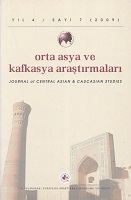CONTESTED AUTONOMY: TATARSTAN UNDER PUTIN (2000-2004)
CONTESTED AUTONOMY: TATARSTAN UNDER PUTIN (2000-2004)
Author(s): Matthew DerrickSubject(s): Politics / Political Sciences
Published by: USAK (Uluslararası Stratejik Araştırmalar Kurumu)
Keywords: Sovereignty; Autonomy; Tatarstan; Russia; Putin
Summary/Abstract: The purpose of this article is to try to understand why central attacks on the Tatarstan’s autonomy have failed to produce a significant popular backlash in that republic. Why did Tatarstan, defying most expectations, not go the way of Chechnya, to which it was often compared in the 1990s? Kazan-based observers generally explain Tatarstan’s apparent lack of passionate displeasure in economic terms: Because Tatars feel they have not benefited materially from sovereignty they sense nothing has been lost with the revocation of this status. This interpretation reflects a disappointment in the 1990s market reforms and the sense that life today is less secure than it was under Soviet rule. While this explanation helps to illuminate part of the story, there exists substantial evidence to suggest that non-material factors also play a significant role. As I contend in this paper, fundamental issues of history and geography play a role in shaping outcomes. Specifically, a constituent region of the Russian state for nearly half a millennium, Tatarstan today is place that is seen by a majority of the republic’s citizens, Tatar and Russian alike, as an inextricable part of a greater multinational expanse, part of a greater multinational dialog.
Journal: Orta Asya ve Kafkasya Araştırmaları
- Issue Year: 2009
- Issue No: 07
- Page Range: 45-74
- Page Count: 29
- Language: English
- Content File-PDF

